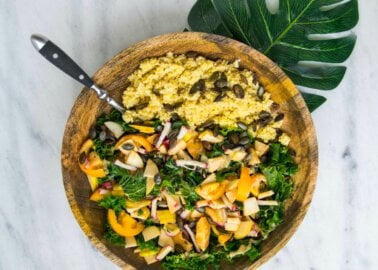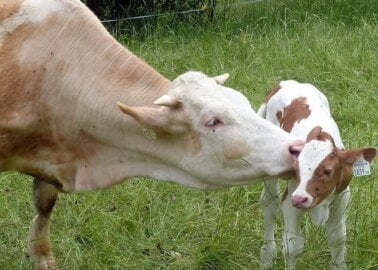Prince Charles Under Fire for Proposed Cow Farm Expansion
Following the submission of a planning application to the Borough Council of King’s Lynn and West Norfolk to expand the Sandringham Estate’s cow farm by 500 animals, PETA rushed a letter to Prince Charles – who manages the estate – urging him to withdraw the application and move towards sustainable plant-based agriculture instead.

In the letter, PETA explains why the estate should make the compassionate move:
“When you consider everything we know today about the intelligence and emotional complexity of cows, bulls, and other animals – when you recognise that they have distinct personalities and a will to live – it becomes impossible to justify killing them for a fleeting moment of taste.”
Cows Aren’t Ours to Eat
Just like humans, cows form close friendships, and they grieve when their friends or family members die. Yet in the beef industry, families are torn apart, calves are mutilated, and many cows are just 18 months old when they’re sent to the abattoir, where workers shoot them in the head with a captive-bolt gun, hang them up by one leg, and cut their throats, sometimes while they’re still conscious.
How Meat Fuels the Climate Crisis
Raising and killing cows for their flesh is also destroying our planet. According to a United Nations report, animal agriculture is “one of the top two or three most significant contributors to the most serious environmental problems, at every scale from local to global”.
Scientists at the University of Oxford have calculated the massive damage that animal agriculture does to the planet. They found that despite providing only 18% of calories and 37% of protein globally, the meat, aquaculture, egg, and dairy industries use approximately 83% of farmland and are responsible for up to 58% of the food industry’s greenhouse-gas emissions.
Speaking about “grass-fed beef”, Joseph Poore, the lead author of the study, said, “Converting grass into [meat] is like converting coal to energy. It comes with an immense cost in emissions.”
The production of beef is responsible for more greenhouse-gas emissions than that of any other food – a staggering 40 times more than the production of beans or peas. The beef industry is a major contributor to the Amazon rainforest fires, deforestation, drought, and water and air pollution.
Animal Agriculture Breeds Disease
Eating cows and other animals not only causes animals immense suffering and damages the planet but also has fatal consequences for humans.
Deadly outbreaks of swine flu, avian flu, SARS, HIV, foot-and-mouth disease, mad cow disease, and other zoonotic diseases have stemmed from capturing wild animals or farming animals.
In addition to carrying a high risk of contamination from pathogens – including E coli, campylobacter, and salmonella – meat is laden with artery-clogging saturated fat and cholesterol and contains no fibre.
The World Health Organization has classified the consumption of processed meat as carcinogenic, in the same category as smoking cigarettes.
What You Can Do
The best thing you can do for animals, your health, and the planet is to go vegan. It’s the simplest way for each person to reject the daily cruelty that occurs in abattoirs and on farms in the UK and elsewhere. Vegans are also less prone to suffering from cancer, obesity, and diabetes than meat-eaters are and have a smaller carbon footprint.
To get started, order a free vegan starter kit full of tips and advice for every part of your journey:



